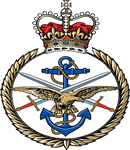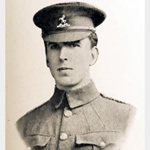Commemorated: | |||
| 1. Memorial: | Thiepval Memorial, Picardie | Pier and Face 5 A and 6 C. | |
| 2. Book: | The (1921) Masonic Roll of Honour 1914-1918 | Pg.130 | |
| 3. Memorial: | The (1940) Scroll - WW1 Roll of Honour | 58A GQS | |
Awards & Titles: | Distinguished Service Order Military Cross | ||
Early Life :
James Mould was born in Chorley c.1883, Lancashire to James and Mary Maud Mould. He was educated at Chester County School and entered the teaching profession himself, spending seven years teaching at Skinners School, Tunbridge Wells, Kent, where he was responsible for the school OTC. He also taught in Newfoundland for two years and was then appointed to Dudley Grammar School. He took command of the school cadet corps as Captain and was also Commandant of the Dudley Volunteer Training Corps. He lived at 17 Parkhill Street, Dudley.He married Helen Willshaw (b.1886) at Bedford, 19th July, 1908.
His portrait photograph is repeated in different sources including Pages of the Sea and Men and Memorials of Dudley.
Service Life:
Campaigns:
- The First World War 1914-1918, World-wide.
| Unit / Ship / Est.: 3/Worcestershire Regiment |
3rd Battalion August 1914 : in Tidworth. Part of 7th Brigade in 3rd Division. Landed at Rouen 16 August 1914. 18 October 1915 : transferred with Brigade to 25th Division. 10 November 1915 : transferred to 74th Brigade in same Division. 22 June1918 : transferred to 57th Brigade in 19th (Western) Division, absorbing 10th Bn |
| Action : The Battles of the Somme 1916 |
The Battle of the Somme 1st July - 18th November 1916 is inevitably characterised by the appalling casualties (60,000) on the first day, July 1st 1916. Having failed to break through the German lines in force, and also failed to maximise opportunities where success was achieved, the battle became a series of attritional assaults on well defended defence in depth. The battle continued officially until 18th November 1916 costing almost 500,000 British casualties. German casualties were about the same, and French about 200,000. The Somme could not be counted a success in terms of ground gained or the cost, but it had a strategic impact as it marked the start of the decline of the German Army. Never again would it be as effective whilst the British Army, learning from its experience eventually grew stronger to become a war winning army. The German High Command recognised that it could never again fight another Somme, a view that advanced the decision to invoke unrestricted submarine warfare in an attempt to starve Britain of food and material, and in doing so accelerated the United States declaration of war thus guaranteeing the eventual outcome. 287 Brethren were killed on the Somme in 1916.
Detail :
Capt James MOULD 3rd Battalion, Worcestershire Regiment. Died of Wounds 3rd September, 1916.
He volunteered in March 1915, was commissioned to the Worcesters and joined the 4th Battalion on Gallipoli on 16th June, 1915 as 2nd Lieutenant. They had suffered heavy losses by the time of his arrival and he was immediately plunged into the problems of close trench fighting against an experienced enemy. The third battle of Krithia on the 4th June had failed when the troops could not make their way up Gully Ravine. A second major attack was made within two weeks of Mould's arrival. The Worcesters were not involved until the third day by which time the first troops had suffered heavily. The Turks were ready to counter-attack and to prevent this two parties of 30 men, one led by Lt Herbert James and the other by Lt Mould, bombed their way up the trenches to rescue many fallen troops. No ground was gained but their gallantry saved many wounded.
He was awarded a Military Cross as a result of his actions on 2-3rd July, 1915 in the action at Gully Ravine during the Battalion's Krithia attack. Lieutenant MOULD led the bombing party in the right sap in the attack whilst Lieutenant Herbert JAMES led the bombing party in the left sap. For the action in which MOULD was awarded the MC, JAMES was awarded the VC. Like many others Lt Mould was affected by dysentery and invalided to England. He was then promoted to Captain and posted to the 3rd Battalion on the Western Front and was quickly into action in the Battle of the Somme. In the attack on Ovillers 13-14 July, 1916 MOULD held a vital trench block against counter attack was awarded a DSO. He was mortally wounded in a 3rd Battalion, Worcestershire's attack on the Leipzig Redoubt on 3rd September, 1916. The Battalion suffered 101 casualties (including 7 Officers) on that day.
In a letter to his wife his Commanding Officer described him as a 'magnificent officer' and 'beloved of all'.
Probate MOULD James of 17 Park-hill-street Dudley Worcestershire captain 3rd battalion the Worcestershire regiment D.S.O. died 3 September 1916 on active service in France Administration Worcester 21 June to Helen Mould widow. Effects £117 14s. 2d.
Because of the intensity of the action his body was not recovered and he is commemorated on the Thiepval, Dudley, St. John's, Kates Hill and Dudley Grammar School Memorials.
Masonic :
| Type | Lodge Name and No. | Province/District : |
|---|---|---|
| Mother : | Whiteway Lodge No. 3541 E.C. | Newfoundland |
Initiated | Passed | Raised |
24th April 1914 | 29th May 1915 | - |
James Mould is listed as a Schoolmaster in the register of Whiteway Lodge No. 3541 at St. John's. Newfoundland the place of his residence. The contribution record shows his war service, which prevented him from taking his last step. If further shows that he was "Killed on AS, 3.9.16."
Source :
The project globally acknowledges the following as sources of information for research across the whole database:
- The Commonwealth War Graves Commission
- The (UK) National Archives
- Ancestry.co.uk - Genealogy, Family Trees & Family History online
- ugle.org.uk - The records of the United Grand Lodge of England including the Library and Museum of Freemasonry
Additional Source:
- Founder Researchers : Paul Masters & Mike McCarthy
- Researcher : Bruce Littley

